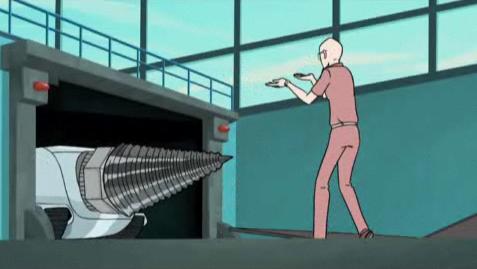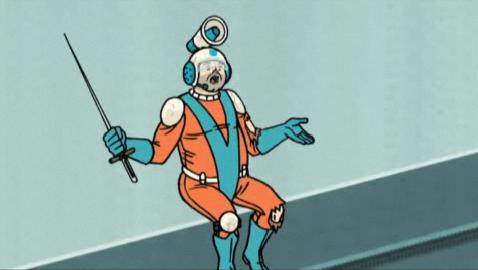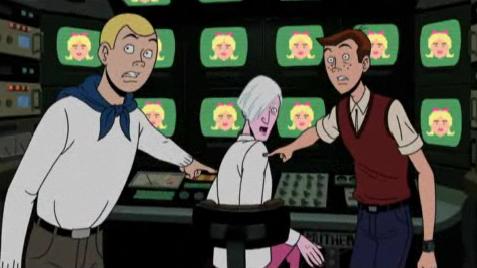The Venture Bros.:
What Goes Down, Must Come Up
A more appropriate title there never was. From the weakest episode of the season to one of the strongest episodes yet, What Goes Down represents an almost distracting surge in quality. A far cry from Quymn's slap-happy sex festival, this week's installment is loaded with familial symbolism, rich with history, and rewardingly complicated.
 |
When this episode ended, I felt satisfied. This was exactly the kind of episode I was hoping for in season three, and yet I didn't even know it. It was so perfect, so creepy and so funny that it just might do the impossible and unseat The Invisible Hand of Fate as my pick for best of the season.
I just wanted to get that out of my system at the head of the review so that there'd be absolutely no confusion about where I stood. What Goes Down, Must Come Up is brilliant, brilliant television.
Its concept? Well, I'm compelled to devote my entire review of the episode to its apparent themes, but let's see if I can keep those urges at bay for a short time at least and discuss plot instead.
The episode opens with Dr. Venture and Brock pulling out Jonas Venture's old drilling machine. This obviously goes wrong quickly (after a wonderfully self-conscious exchange commemorating the sexual nature of what's happening--oops, looks like themes are seeping into my synopsis after all) and Venture tumbles backward into an underground section of the compound that's been sealed off for thirty years. Then, while attempting to rescue him, Brock gets locked in a fallout shelter with a tiny, tiny little man.
Rusty, it is gradually revealed, is also in a fallout shelter--the Venture compound had two of them...one designed by Rusty's father, and the other, it is at least mildly suggested, was designed by his mother. In both cases Jonas abandoned the occupants of the shelter, and Brock and Rusty both manage to piece together the two halves of our story.
Sounds a bit plot-heavy, doesn't it? Well, it sure was in danger of becoming so. But, as with The Invisible Hand of Fate, Jackson Publick was wise enough to insert comic slivers into the story in such a way that the laughs are generated without the tension being relieved. Unlike The Invisible Hand of Fate, however, these comic segments are more organic to the episode, and don't involve cutting away from the action entirely.
 |
Instead of a self-contained comic setpiece like the O.S.I. commercial or the Nozzle segment, we get lots of excellent (and I do mean excellent) Hank material, the best role yet for underused blacula hunter Jefferson Twilight, and an always welcome--and for once helpful--appearance by Pete White.
The above-ground rescue operation accounts for most of the bigger laughs, but there is plenty of comedy inherent in both of the fallout shelter plots as well--it's just a different kind of humor, and one as likely to unsettle you as it is to make you laugh.
Rusty's plot is the more important one to the episode, and it's also the scarier of the two. He finds himself among strange mal-adjusted humans who have been living in his father's fallout shelter for three decades without any news of the above world. It transpires that something went seriously wrong during a tour of the facility and Jonas sealed it off forever, abandoning the children down there to die. Only they didn't die; they forged a society of their own, and started worshipping Jonas as a God--thanks in large part to a series of videos left behind for Rusty, in the event that the boy actually needed to make use of the shelter.
Meanwhile Brock is trapped in a separate fallout shelter with the diminutive Dr. Entmann, who stands about as tall as Brock's palm and was also abandoned by Jonas...simply because Jonas forgot about the little guy. There's also a master computer in the room named M.U.T.H.E.R. who is accidentally re-activated and threatens nuclear annihilation if she doesn't get to speak to the elder Dr. Venture.
That's only about 2/3 of the plot, and puzzling out exactly what happened is almost as rewarding as obsessing over what it means. Because, after all, there are obviously strong themes at play. Abandonment is a clear one. There's also a lot of light shed on Rusty's own regard for others...his sealing of Billy and the unfortunate child in the E-Den with a raging gorilla suddenly seems like more his father's fault than his own. And speaking of parents...
 |
Was M.U.T.H.E.R. based on Rusty's actual mother? It certainly seems that way, as Dr. Entmann refers to disagreements between the two...disagreements that seem to be far more deeply rooted than "computer" and "programmer." Regardless, the parallel is overt and successfully troubling--the underground civilization living in doe-eyed awe of the father who left them to die and the tiny little man living in fear of his overbearing M.U.T.H.E.R. whose displeasure can destroy the world. And who's up for writing a dissertation on the meaning of the final scene, in which the computer and the videotaped image of Jonas "converse" in an exchange that is, technically, conversation, without either of them recognizing the artificiality (or self-centeredness) of the other.
It's a great and satisfying episode that will give us much to pore over on DVD, and it's easily got to be one of the best overall episodes yet.
Also, can I take a short moment here to hope openly that we get to see more of Dr. Entmann? That tiny little guy...that bearded, pudgy, tiny little guy was just wonderful. He's a great and complicated character who even feels bad for his anger toward Jonas...the man who negligently sealed him alone in a room for thirty years. He's adorable. And Stephen DeStefano did some phenomenal things with his portrayal of the character. It was just the right mix of sympathy and pathos, and his forced conversations with Brock were some of the best things The Venture Bros. has done yet.
Great job on this one, Jackson. You really managed to smack it clear out of the park.
![]()
About this entry
- By Phil Reed
- Posted on Monday, July 14 2008 @ 2:53 pm
- Categorised in TV, Review
- Tagged with the venture bros
- 0 comments
